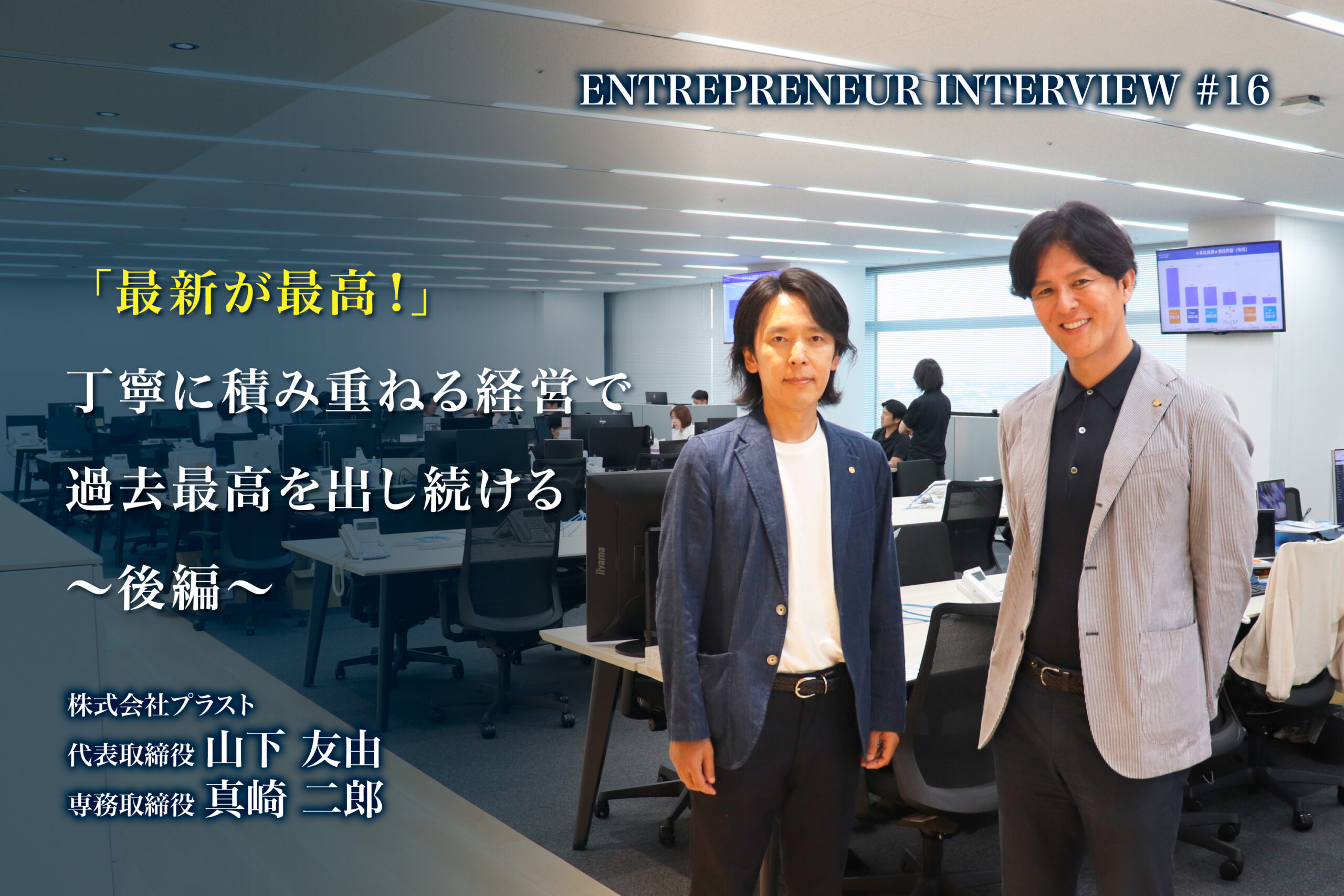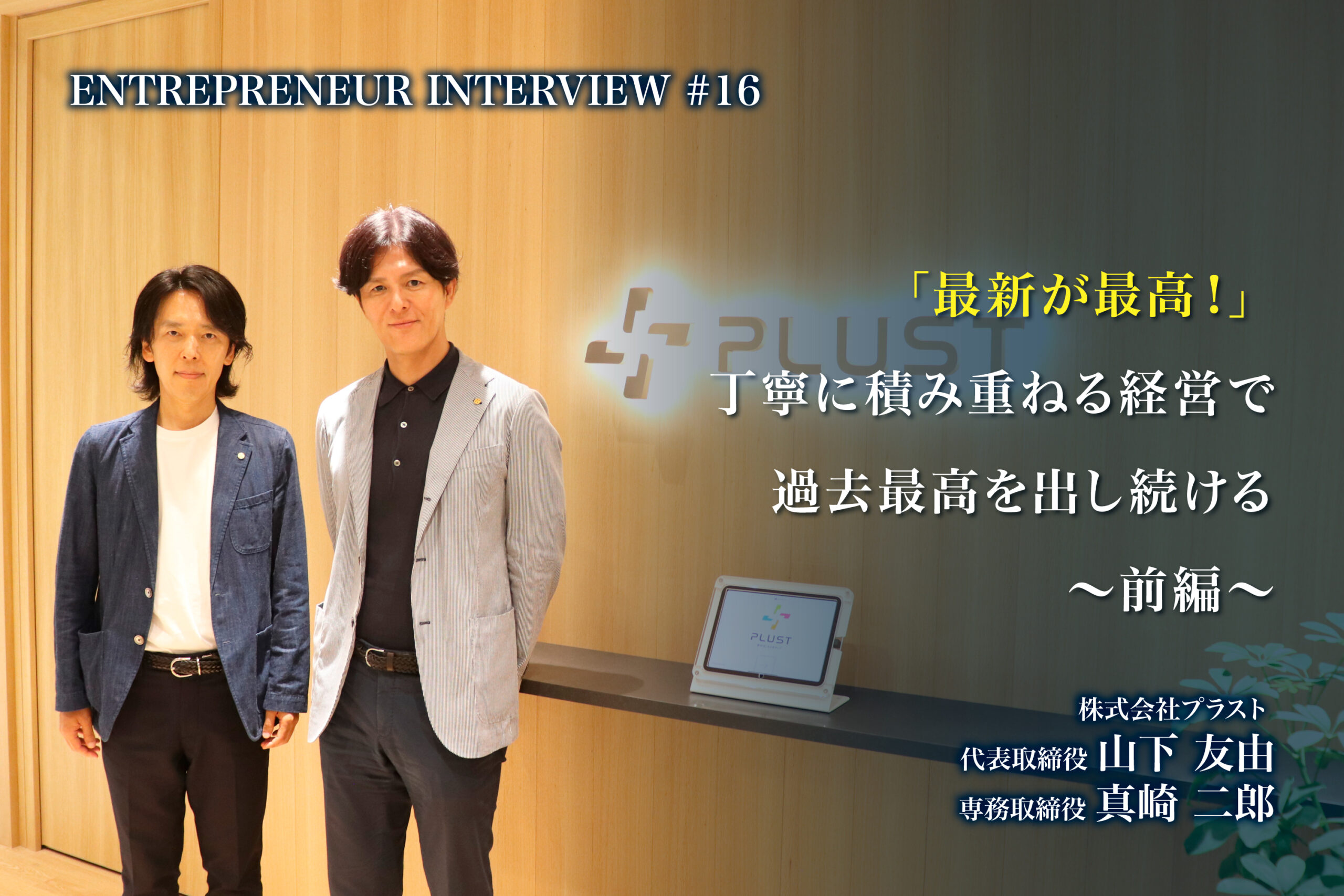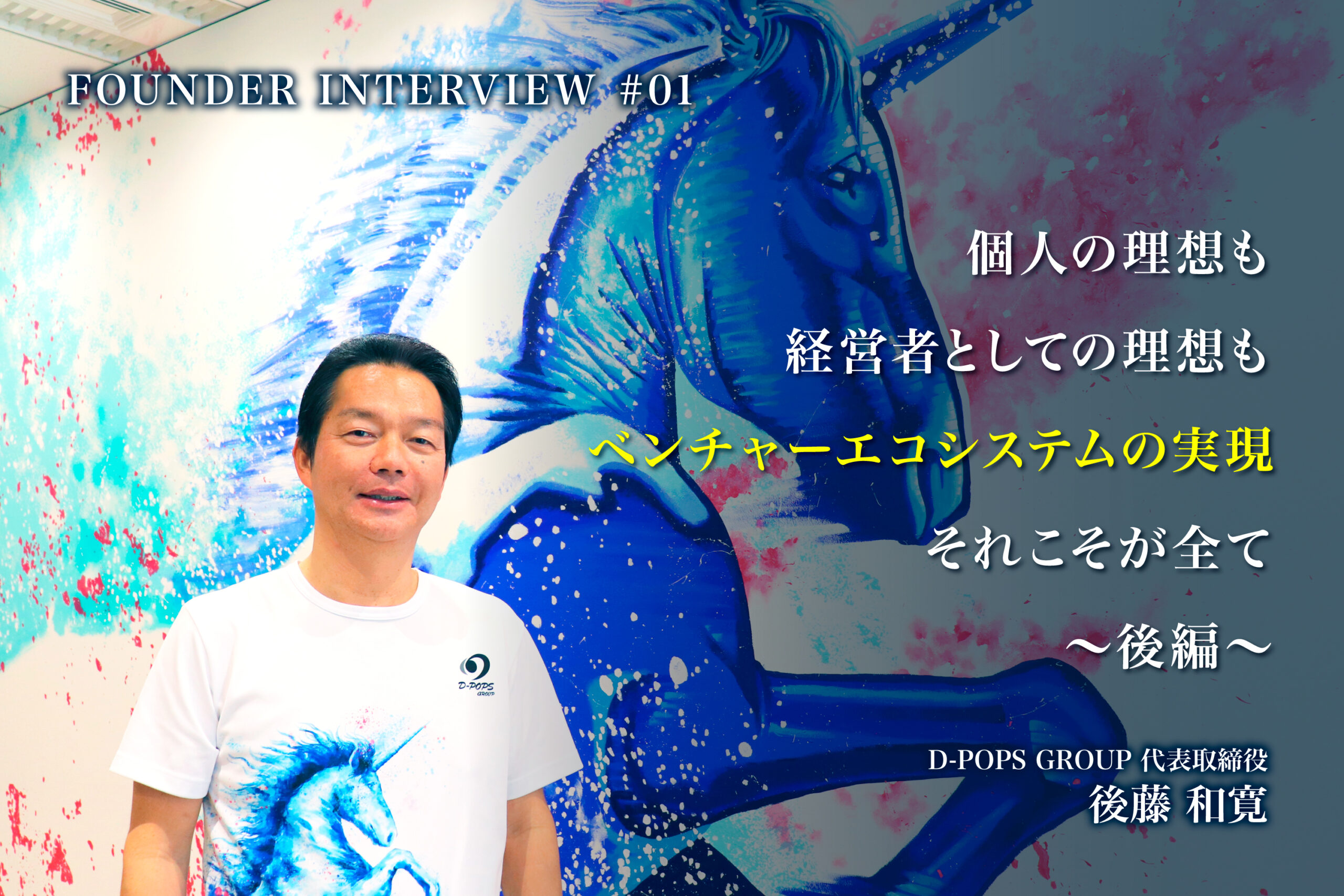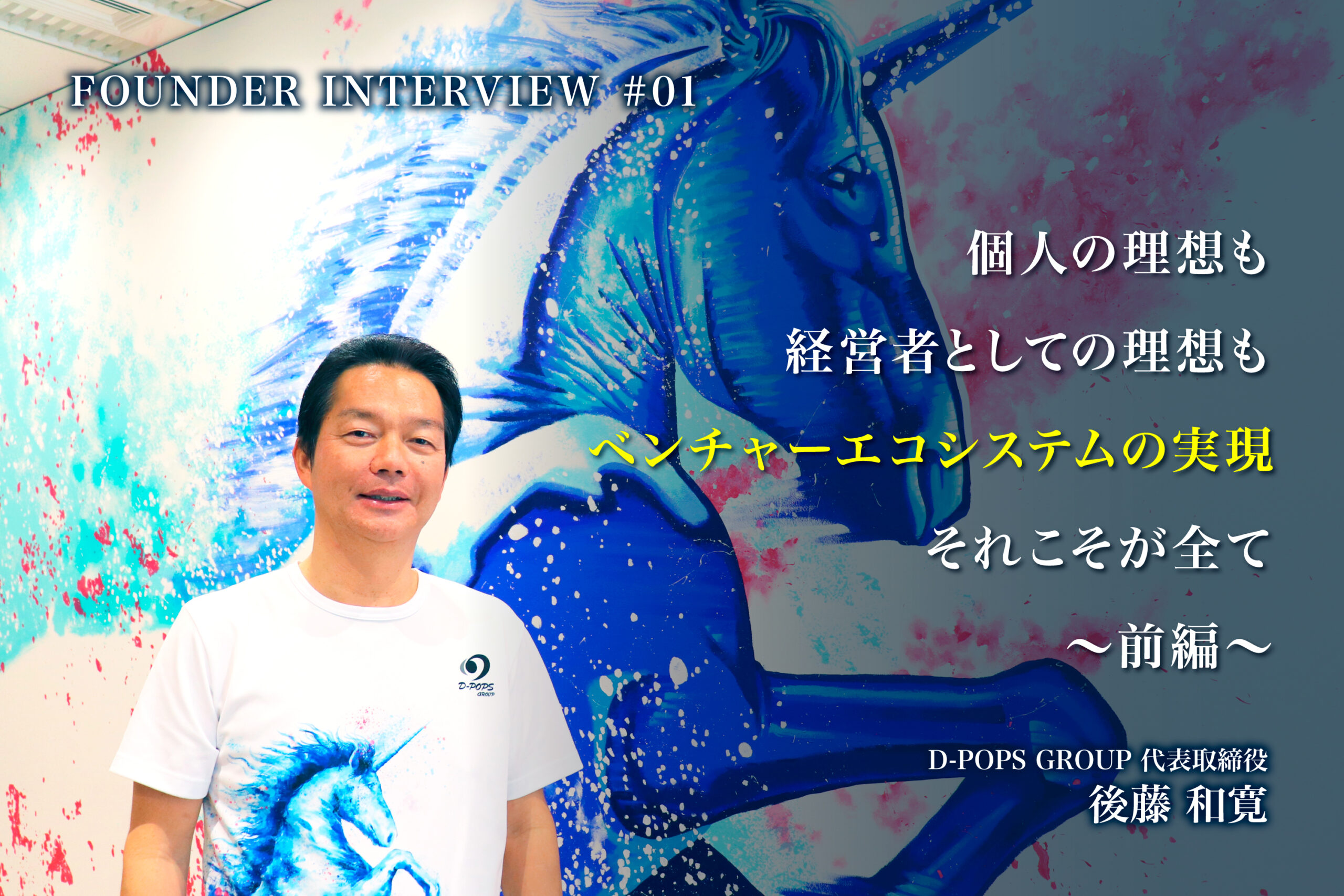
Personal ideals, and ideals as a business owner, all about realizing a Venture Ecosystem
For this article, we interviewed our own President and CEO of D-POPS GROUP! Our company is aiming to realize a “Venture Ecosystem” that is indispensable to society. We are striving to create a platform where startup companies can grow.
We asked President Goto about his thoughts on realizing a Venture Ecosystem and contributing to society.
(This interview was conducted in July 2025.)
Sugihara:
It’s been over 27 years since you founded your original company, D-POPS, and this October 1st will mark exactly 10 years since D-POPS GROUP was established and you transitioned to a group company management system. About five years ago, you started advocating for ecosystem management. Could you describe your journey of these past 27 years, as well as the past 10 years of group management and the last five years of ecosystem management?
Goto:
To put it simply, I’d say my life as a business owner has been like that of a Buddhist monk training in the mountains, ha ha. It’s been a continuous series of hardships—all kinds of adversity, headwinds, and hitting rock bottom. At the same time, there’ve been many moving experiences and memorable encounters, and I can truly say it’s been a fulfilling 27 years.
Initially, as the CEO of a startup, I focused on business and built a 10-billion-yen company. But I also experienced how focusing solely on one business and being dependent on a single revenue stream could be a major risk. From there, I decided to transition to full-scale group company management.
After transitioning to group management and managing 10, then 15 companies, I received a lot of requests to give lectures and lead study groups. As I accepted these requests within my capacity, I got to know the reality of entrepreneurs and business owners who, like me, were truly struggling to manage their businesses. The study group where I felt the most direct connection, where I could remember the faces and businesses of all participants over the years, eventually developed into the “Goto School” intensive training sessions that I now hold almost every month. So far, approximately 300 entrepreneurs and business owners have participated. As a result, the inspiration to dedicate my life to realizing a Venture Ecosystem—or, as you said it, the start of “ecosystem management”—suddenly came to me.
Through the creation of this Venture Ecosystem platform, we increase our number of allies, enable the sharing of know-how, information, and networks with each other, and even if one company suddenly faces headwinds, suffers a big deficit, or hits rock bottom, the Venture Ecosystem protects and supports it, achieving a strong risk portfolio. These allies can be in any form, such as group companies, investment portfolio companies, or strategic capital and business alliances. I even support companies with which we have no financial relationship. Ultimately, what I want to achieve is the establishment of a social system that supports entrepreneurs and managers by walking alongside them.
Sugihara:
As an entrepreneur, you have walked a difficult path that the average company employee in the world today couldn’t even imagine. What has been the source of your drive and passion?
Goto:
When it comes to passion, I have never lost it since starting my business. It’s been overflowing continuously since I was 25. The source of it was a study abroad experience in the UK.
I saw so many students from around the world who had a clear dream for the future and were studying incredibly hard to achieve it. Before studying abroad, I honestly spent my college years just having fun (like being the president of a tennis club and an intercollegiate club), but I started to feel a great sense of anxiety about the future of Japan.
I worried that 10 or 20 years from now, with Japan’s economic power declining and other countries developing significantly, especially in Southeast Asia and the BRICS nations, I feared that we would be unable to maintain the prosperous Japan that our predecessors built before and after the war. Then, just as I was thinking how I wanted to powerfully nurture and change young Japanese people, I came across a book by Konosuke Matsushita and realized that company management could be a way to foster young talent.
Initially, my passion was focused on directly nurturing young people. When the number of employees grew to several hundred, I focused on nurturing executives. When the number of employees reached several thousand, I dedicated my efforts to fostering entrepreneurs and presidents. But the core principle has always been the same: I want to create an environment where young people who will lead Japan’s future can grow and take on challenges. I believe that has continuously been the source of my passion.
I always hope to leave a better society for the next generation of children and the generations after them, even after I am gone. Ultimately, I want to do this not only for Japan but for all people on Earth.
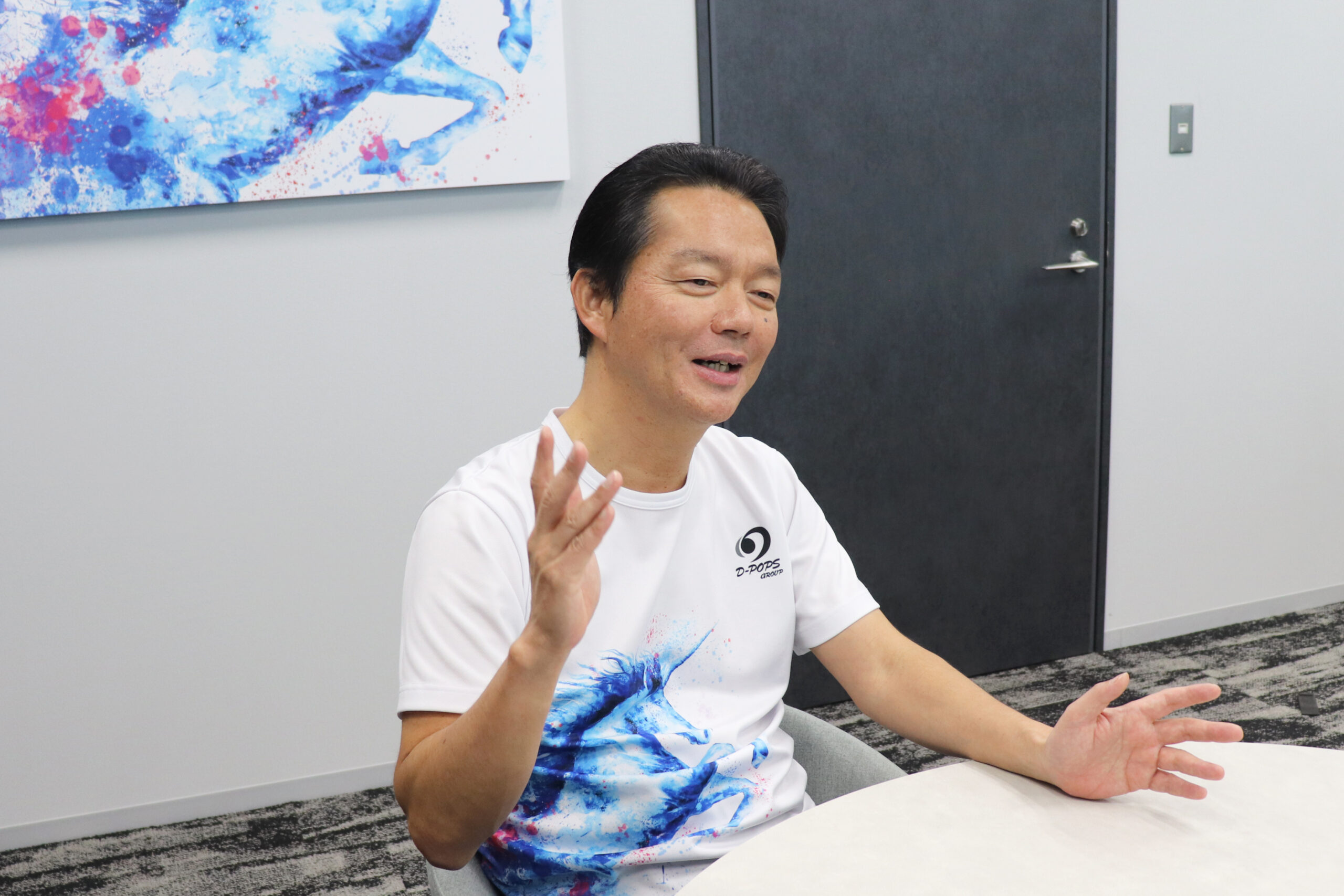
Sugihara:
I imagine that your difficult journey was saved by many instances of great fortune and strong luck. Could you share with our readers any secrets you have for “taking hold of strong luck”?
Goto:
Simply put, I place a lot of importance on being the kind of person that even God might want to support. I also believe it’s important to have an unrivaled passion, to put in effort that is second to none, and to have a vision and goals that have social significance. In addition, I think one needs to have a heart of sincerity, humility, and gratitude.
Even I am shocked by how good luck completely disappears when I stray away even slightly from these practices, but when I follow them diligently, then astonishingly great circumstances occur. One more thing I would add is that I think it’s very important to associate with people who also have good fortune. I feel that our chairman, Dr. Semmoto, and our corporate advisor, Mr. Fujisaki, are like sources of strong luck for me. I feel the same way about our non-executive director, Mr. Naito, and our advisor, Ms. Ishiguro.
Sugihara:
In your stories, you often say that you owe everything to your connections*. What conscious efforts are you doing on a daily basis to maintain good connections?
*The original Japanese term connotes both fate as well as one’s connections with others.
Goto:
My answer is quite similar to my response about strong luck. I believe that good connections are born from making sure that positive energy overflows from within myself. In other words, from having an altruistic heart and love. And also, when an opportunity presents itself, making sure to properly convey the vision and social impact I am trying to achieve. I feel that when people are on the same page as me, our bond deepens; sometimes they support or help me; and in the end, it becomes a good connection.
Sugihara:
You as an individual and D-POPS GROUP as a company are involved in many social contribution activities, such as supporting the “Walking Together Hand-in-Hand with Children Foundation” and the non-profit organization “bond Project”. Are these efforts in CSR activities also based on your idea of improving your luck?
Goto:
Yes, that’s right. My desire to help suffering children—even just a little—is pure, but when I put my energy into activities like these, I also have this mysterious feeling that good fortune will come to me as a result. However, even if good fortune doesn’t come, I think it’s a natural human instinct to wonder if you can do something to help when you see a child or a person who is suffering.
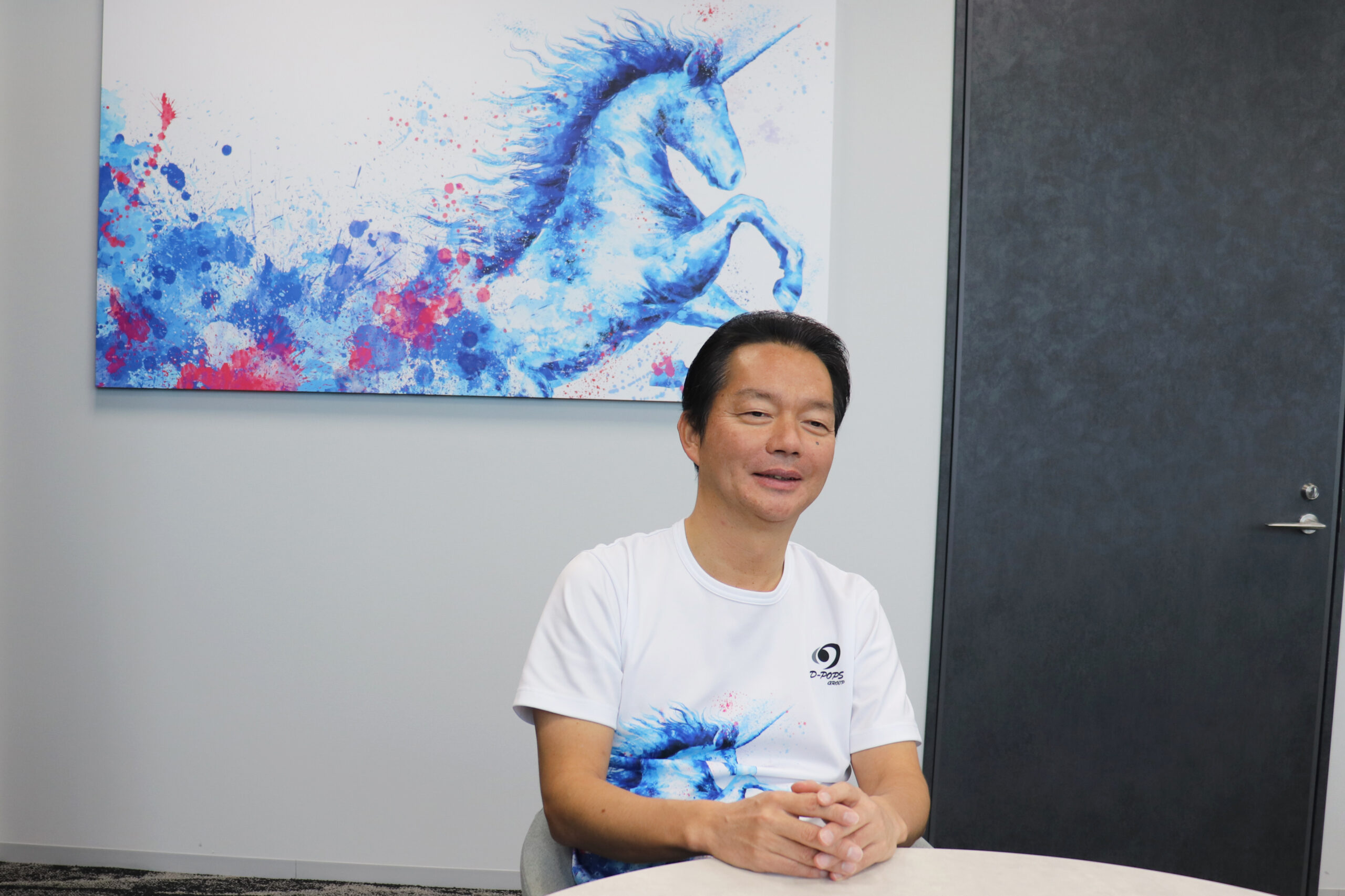
Sugihara:
So, you’ve grown D-POPS GROUP to this large size through your management skills, your constant effort, and being blessed with good fortune and great connections. The company’s sales have surpassed 30 billion yen, and it is already big enough to be listed on the Tokyo Stock Exchange, even under the newly-revised listing requirements. Could you tell us why you are choosing to remain unlisted?
Goto:
Naturally, I understand the benefits of being a listed company, but my management style is quite unique, so I think it would be difficult for all investors to understand it. I’m constantly investing with a medium-to-long-term vision (I don’t worry too much about short-term results), and I devote about 15% of my time to the activities of the aforementioned foundation that supports abused children. Another form of volunteering I do is to spend about 20% of my time on the so-called Goto School (supporting the individual growth of entrepreneurs), which I convene when requested.
If I were the president of a listed company, my mission would naturally be to focus on producing results for my company, and I feel that doesn’t fit with who I am right now. However, listed companies have already emerged from within our Venture Ecosystem, and many more are expected to be born from it in the future.
Sugihara:
So, for you personally, going public is not a goal or an objective. On the other hand, you support startups aiming to go public by offering investment and management advice. You also have a vision of building a platform that will produce numerous “unicorns”. What kind of support activities do you engage in, both as an individual and as D-POPS GROUP?
Goto:
Honestly, this is also difficult to answer in one word. I could say that I am available to entrepreneurs and business owners for advice and questions 24 hours a day, 365 days a year. I fully mobilize all my knowledge, experience, know-how, network, and the majority of my time for the sake of CEOs who are going through a particularly tough phase or to the leaders of growing companies that are experiencing a growth curve. And as balls get tossed into my court from every angle, I use my 27 years of experience and database to provide support.
As an active business owner who has managed many companies, and now with almost 60 group and investment companies, holding Goto School for representatives from 300 companies, and other various activities in my life, I believe there are extremely few business owners in the world in a similar position as mine. That’s why I work hard every day with the belief that I must be the one to create a Venture Ecosystem in Japan. When I’ve been able to guide the CEO of a company on the verge of bankruptcy to make a V-shaped recovery, I can truly feel the social significance of my work.
Sugihara:
Although it’s a private company, the board of directors and advisory team have a truly impressive lineup. You have also gradually increased the number of advisory members, including myself. As much as you can share publicly, could you explain your thoughts on the meaning and purpose of this structure?
Goto:
Frankly speaking, I am a total expert in management strategy, so I believe that technical matters are best handled by professionals in those fields. In that sense, I think it’s very important to have many “super specialists” on my team of advisors, and I find them all to be incredibly reliable.
The people we support are entrepreneurs, and as such, they won’t listen to someone unless that person has skills that are on another level. Because of this, I am always on the lookout for such people, hoping that even just one of them will join our team every few years. The members of our Board of Directors and our advisors are my mentors, coaches, and sometimes even feel like a father, an older brother, or an older sister to me. In other words, the Venture Ecosystem is also functioning for my own growth, and I am always being helped by it.
Interview conducted by D-POPS GROUP’s advisor Genta Sugihara.
D-POPS GROUP
Company President and CEO: Kazuhiro Goto
Address: 32F Shibuya Hikarie Bldg., 2-21-1 Shibuya, Shibuya-ku, Tokyo
Established: October 1, 2015 (Founded: February 4, 1998)
Website: https://d-pops-group.co.jp/en/
Next, in the latter part of the interview, we discuss:
・Success stories unique to the ecosystem
・The complexification strategy
・The “ideal form” of a Venture Ecosystem
・Venture Ecosystem Summit 2025
・And other topics
Be sure to check it out here:
https://d-pops-group.co.jp/en/column/executive-interview02-latter-part/




